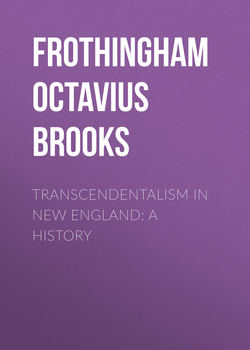Transcendentalism in New England: A History

Реклама. ООО «ЛитРес», ИНН: 7719571260.
Оглавление
Frothingham Octavius Brooks. Transcendentalism in New England: A History
PREFACE
I. BEGINNINGS IN GERMANY
II. TRANSCENDENTALISM IN GERMANY
KANT
JACOBI
FICHTE
SCHELLING
III. TRANSCENDENTALISM IN THEOLOGY AND LITERATURE
IV. TRANSCENDENTALISM IN FRANCE
V. TRANSCENDENTALISM IN ENGLAND
VI. TRANSCENDENTALISM IN NEW ENGLAND
VII. PRACTICAL TENDENCIES
VIII. RELIGION
IX. THE SEER
X. THE MYSTIC
XI. THE CRITIC
XII. THE PREACHER
XIII. THE MAN OF LETTERS
XIV. MINOR PROPHETS
XV. LITERATURE
Отрывок из книги
To make intelligible the Transcendental Philosophy of the last generation in New England it is not necessary to go far back into the history of thought. Ancient idealism, whether Eastern or Western, may be left undisturbed. Platonism and neo-Platonism may be excused from further tortures on the witness stand. The speculations of the mystics, Romanist or Protestant, need not be re-examined. The idealism of Gale, More, Pordage, of Cudworth and the later Berkeley, in England, do not immediately concern us. We need not even submit John Locke to fresh cross-examination, or describe the effect of his writings on the thinkers who came after him.
The Transcendental Philosophy, so-called, had a distinct origin in Immanuel Kant, whose "Critique of Pure Reason" was published in 1781, and opened a new epoch in metaphysical thought. By this it is not meant that Kant started a new movement of the human mind, proposed original problems, or projected issues never contemplated before. The questions he discussed had been discussed from the earliest times, and with an acumen that had searched out the nicest points of definition. In the controversy between the Nominalists, who maintained that the terms used to describe abstract and universal ideas were mere names, designating no real objects and corresponding to no actually existing things, and the Realists, who contended that such terms were not figments of language, but described realities, solid though incorporeal, actual existences, not to be confounded with visible and transient things, but the essential types of such, – the scholastics of either school discussed after their manner, with astonishing fulness and subtlety, the matters which later metaphysicians introduced. The modern Germans revived in substance the doctrines held by the Realists. But the scholastic method, which was borrowed from the Greeks, lost its authority when the power of Aristotle's name declined, and the scholastic discussions, turning, as they signally did, on theological questions, ceased to be interesting when the spell of theology was broken.
.....
Fichte considered himself a pure Kantean, perhaps the only absolutely consistent one there was; and that he did so is not surprising; for, in mending the master's positions, he seemed to be strengthening them against assault. He did not, like Jacobi, draw inferences which Kant had laboriously, and, as it seemed, effectually cut off; he merely entrenched himself within the lines the philosopher of Königsberg had drawn. Kant had, so his critics charged, taken for granted the reality of our perceptions of outward things. This was the weak point in his system, of which his adversaries took advantage. On this side he allowed empiricism to construct his wall, and left incautiously an opening which the keen-sighted foe perceived at once. Fichte bethought him to fortify that point, and thus make the philosophy unassailable; to take it, in fact, out of the category of a philosophical system, and give it the character of a science. To this end, with infinite pains and incredible labor, he tested the foundations to discover the fundamental and final facts which rested on the solid rock. The ultimate facts of consciousness were in question.
Fichte accepted without hesitation the confinement within the limits of consciousness against which Jacobi rebelled, and proceeded to make the prison worthy of such an occupant. The facts of consciousness, he admitted, are all we have. The states and activities of the mind, perceptions, ideas, judgments, sentiments, or by whatever other name they may be called, constitute, by his admission, all our knowledge, and beyond them we cannot go. They are, however, solid and substantial. Of the outward world he knew nothing and had nothing to say; he was not concerned with that. The mind is the man; the history of the mind is the man's history; the processes of the mind report the whole of experience; the phenomena of the external universe are mere phenomena, reflections, so far as we know, of our thought; the mountains, woods, stars, are facts of consciousness, to which we attach these names. To infer that they exist because we have ideas of them, is illegitimate in philosophy. The ideas stand by themselves, and are sufficient of themselves.
.....